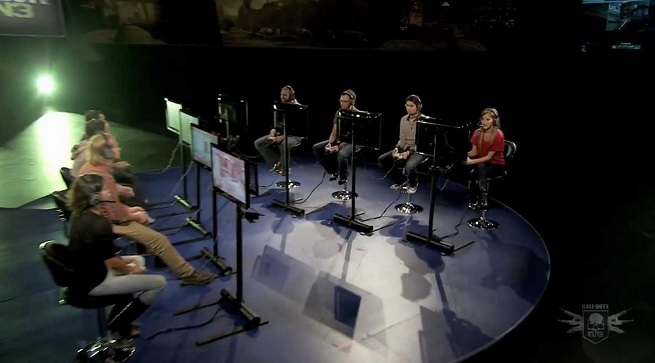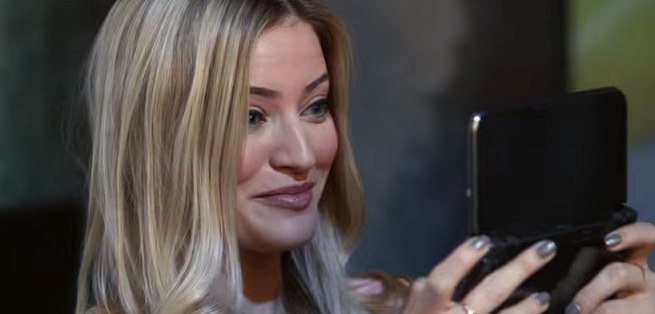Justine “iJustine” Ezarik is a social media star, with frequent TV appearances, 500 million YouTube views, 3.3 million subscribers across three channels, 1.7 million Twitter followers, and a core audience among gamers and nerds.
Game companies want to get attention for their games in a crowded, $95 billion dollar industry, and iJustine is one of the conduits to make that happen. With a chirpy personality, she makes it look easy to get all over the place. She has a book coming from Simon & Schuster this summer. She has worked with brands like Mattel, Microsoft, Ford, Intel, GE, Taco Bell, eBay, Samsung, and others.
She’s a true star of the Internet. But online fans can also become Internet crazies, and the attention can be a double-edged sword. That means that Ezarik has to tread carefully.
We talked to her in advance of the Game Marketing Summit, which will take place in San Francisco on April 22.
Here’s an edited transcript of our interview.
GamesBeat: I see you all over the place. It’s interesting, how you can get yourself out there and get noticed. What’s your thinking or your approach as far as how to get noticed on the Internet.
Ezarik: I’ve been doing this for a long time. I’ve been on a lot of these websites since they were first created. A lot of times, it’s just being an early adopter, trying out a lot of new things. People say, “This site is going to be terrible. Why are you there?” And it ends up being Twitter. I like to experiment with different things and find different uses for them. New things pop up every day – Snapchat, Vine, Parasail.
It’s finding ways to use these things, but also, you have to enjoy doing it as well. It’s something you have to do every single day. I edit and shoot all of my own videos, so if I’m not enjoying that, you’ll probably be able to feel it. It’s a lot of work, but if I’m having fun, it’s worth it.
GamesBeat: When you started out in this career, how did you view yourself? Were you a tech enthusiast? An actress?
Ezarik: I originally studied graphic design and video production. I had wanted to be a programmer — I loved development and coding — but it turned out that I really enjoyed doing the frontend more than backend development. I created websites for people and did graphic design and video projects.
I started posting videos on YouTube mostly because I wanted to teach myself how to use Final Cut. I’d been using Avid and Premiere and I wanted to move on to Final Cut. I started putting myself in these videos, just creating fun little things and putting them on MySpace and early YouTube, and it suddenly got all these hits. But I’d just wanted to show that I could edit, so I could get hired to edit other people’s projects. Now it’s come full circle and I’m editing my own projects, but for other brands and companies as well. It’s interesting, the turn that took.
GamesBeat: I started noticing your work when you were working with Geoff Keighley at Spike TV. Was that one of your big turning points?
Ezarik: Yeah. GameTrailers had this great show and they wanted to do a tech segment. I hosted their GTech segment, which was mostly focusing on things from outside gaming. There was obviously a gaming element to it, but it was more tech-focused. That was a lot of fun, working with Geoff], and I got to cover a lot of events like CES and E3 and Comic-Con.
GamesBeat: When did that start?
Ezarik: It might have been 2011 when I joined. The first thing I did with them was covering a CES.
GamesBeat: How should game companies market their games to get a wider audience? What kind of advice would you have based on what you’ve learned?
Ezarik: It’s finding people who already like your game, or who like things similar to it. With Call of Duty they found me because I posted a video driving one of the RC cars from Black Ops down the promenade or something. It’s being aware of people who are creating content around your game, or your brand in general.
It’s amazing, getting to work with these brands, because you get to take your projects to another level. Being supported by something to create content you’d make anyway makes it that much easier to create better things for your audience. Most of the time, creating stuff for YouTube, you have to do everything on no budget. It’s great to have a budget to work with and do cooler projects.
GamesBeat: Is YouTube still where you find your largest audience?
Ezarik: It’s spread out a lot, actually. I post different content in different places. I feel like YouTube is where I post longer-form content, or if I need to explain something in detail. Facebook is a whole different platform. I’ll post different types of videos there. I’ll put smaller, shorter videos on Instagram. Snapchat is just a daily thing that doesn’t necessarily matter. You can post anything there and it’ll disappear in 24 hours.
Periscope is really interesting, how they’ve taken over the live streaming. Obviously Meerkat was first, and now Periscope. My sister and I had dinner last night while 500 to 1000 people watched us eat. They’re like, “Cool, what are we going to have for dessert?” It’s just interesting having that reaction and being able to have immediate access to people. That’s going to be a problem for YouTube. How does it compete with the immediacy of Snapchat and Vine and all these other services? Mobile is already here and it’s only going to become more important.
GamesBeat: Do you enjoy living an online life?
Ezarik: I do. It’s one of those things—People say, “Oh my God, you totally post everything there.” No. There’s a lot of stuff happening behind the scenes. I don’t just shoot videos and post them. If it was that easy everyone would be doing it.
GamesBeat: Where have you been able to travel? Has it basically taken you around the world?
Ezarik: For Call of Duty we just did coverage for the Call of Duty tournament championships. We went to Australia to cover their regionals and interview their players. We went to London and Paris and Chicago, and finally just two weeks ago we finished the Call of Duty million-dollar championship. Being able to work on a project like that is a lot of fun – working with one of my favorite brands and one of my favorite games. I do a lot of hosting as well, so tying all that in and interviewing the players about their careers as professional gamers is pretty much the perfect project.
GamesBeat: The Internet is a two-way street now. How do you deal with its breed of crazies? Do you have any thoughts on how companies should deal with that?
Ezarik: It is scary. A lot of times you have to take legal action, because a lot of times these people don’t realize that what they’re doing is extremely illegal. You cannot be sending out death threats. You can’t be sending SWAT teams to people’s houses. You’re taking away resources that police forces should be using to do their real jobs. And yet they’re showing up at live streamers’ houses for the sake of someone’s entertainment.
Because we put so much of our lives out there, people sometimes feel personally connected to us. They feel like they can just show up at someone’s house and say, “Hey, I’m here.” No, you can’t really do that. You just have to be really careful. It’s a bigger issue that we can really get into here, I think.
GamesBeat: People still want to have conversations, though. That can lead to fans becoming more enthusiastic about a product or whatever it is that’s being marketed.
Ezarik: For sure. Just having that interaction is awesome. I think I tweeted a podcast that Target replied to, and I’m like, “I can’t believe Target just tweeted me. I shop at Target all the time. That’s where I get everything. And they just sent me a tweet.” And yet we’re really just having a conversation. Sometimes you don’t realize what that can mean to somebody. For me, I’m just having a conversation with people who watch my videos and have some of the same interests. It’s been fun.
One project that’s just come to fruition is the relaunch of my own website, where we can have those sorts of conversations in a safe environment. I control pretty much everything that’s happening there. It’s nice to have a safe place where people can go and feel welcome and not be quite so out in the open the way they are on Facebook or Twitter.
GamesBeat: Everybody’s aware that a lot of advertising money is moving online. It seems like being an Internet personality can be a good business these days.
Ezarik: I’ve always been an entrepreneur, I guess. I was running my own business even before I started doing YouTube videos. One thing that a lot of people don’t realize is that there’s a lot that goes into this. If you have someone shooting and editing and doing all this stuff for you it can be really easy, but that’s not really what YouTubers do. Most of us do everything ourselves. We take pride in the fact that the content we post is something we created. I shot it and edited it. It’s exactly what I want you to see. That’s the difference between us and a lot of more traditional ad-industry content. Kids today are watching this content, though, and they don’t actually care how they get it. For them, TV and the internet are basically the same thing.
GamesBeat: Besides Call of Duty, what other games are you a big fan of?
Ezarik: I play Destiny as well. I just had to take a break. I said, “I just got my alpha four days straight. I need to go outside.” I also love a lot of old Nintendo games, a lot of PC games, especially Minecraft. I think everyone loves Minecraft. Really, I stretch from iPhone games to hardcore first-person shooters. The gaming industry in general is so interesting now. My mom is playing video games on her phone. There’s a blurry line around what’s considered “gaming.”
GamesBeat: Where do you want games to go?
Ezarik: I love mobile gaming. I love being able to take everything with me. If I start a game on my Wii U, say, I want to be able to pick it up on my DS and take it with me when I’m traveling. Any time I travel I end up bringing my Xbox with me, but any way I can make it smaller and more portable and easier to take with me is going to be huge. I used to go to LAN parties in high school and we’d have to lug our computers to people’s houses. Now, if I can take a little Amiibo or a Skylander over to a friend’s house and have an entire game saved there, that’s awesome.
GamesBeat: Where would you like your career to go next?
Ezarik: I’m up for anything, really. If it sounds like a fun project you can usually count me in. We’re working on a movie that should be out for Halloween, so I’m excited about that. I have a book coming out June 2. It’s kind of crazy how all this is coming together, after so many years of just being on the internet. From the outside it may seem like it happened overnight, but definitely not – not for me or a lot of these other creators who’ve been doing it since the beginning.
GamesBeat: It’s snowballing now, though. You’re in a group of essential game marketing people.
Ezarik: I hope so. It’s something I love, and it’s so cool to see people embracing it.
VentureBeat's mission is to be a digital town square for technical decision-makers to gain knowledge about transformative enterprise technology and transact. Learn More






